Application of Geographic Information Systems (GIS) and Remote Sensing (RS) in solid waste management in Southern Africa: a review
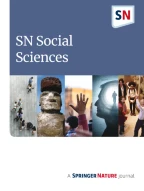
Solid waste is a topical aspect globally owing to limited dumping sites due to its increase attributed to population increase, urbanisation, industrialisation, and diseases. In order to attain sustainable solid waste management, current technology including GIS and RS became relevant. GIS and RS present to be more germane in developed than developing countries. Consequently, this review focuses on application of GIS and RS in solid waste management in Southern Africa (SA). The paper covered published and grey literature related to SA, although literature from other regions was used for benchmarking and comparison purposes. Results illustrate that GIS and RS are utilised in solid waste management issues namely siting of disposal sites and monitoring, accurate solid waste data collection and indicating relationship of landfills with other environmental attributes. GIS and RS guide decision makers when planning solid waste collection routes, areas to place bins and assessing environmental health impacts. Application of GIS and RS in solid waste management in SA is still at an embryonic stage. This scenario is exacerbated by limited solid waste data and technical expertise and financial constraints. However, GIS and RS have potential to enhance solid waste management in SA. Successful utilisation of GIS and RS in solid waste management in SA requires development of a comprehensive GIS database and capacity building to equip responsible stakeholders with necessary skills. Moreover, SA countries are urged to develop policies which support utilisation and integration of technology namely GIS, RS, Global Positioning System and Sensors in solid waste management.
This is a preview of subscription content, log in via an institution to check access.
Access this article
Subscribe and save
Springer+ Basic
€32.70 /Month
- Get 10 units per month
- Download Article/Chapter or eBook
- 1 Unit = 1 Article or 1 Chapter
- Cancel anytime
Buy Now
Price includes VAT (France)
Instant access to the full article PDF.
Rent this article via DeepDyve
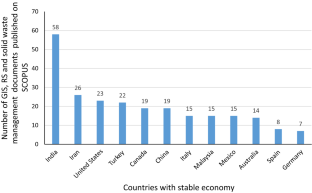
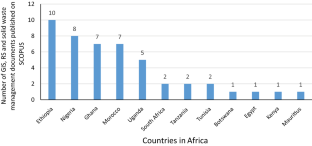
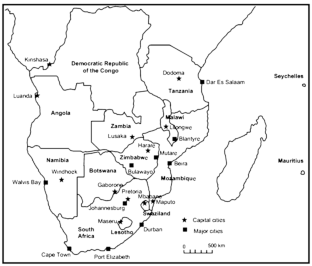
Similar content being viewed by others

An Integrated Solid Waste Management (ISWM) Plan Using Google Earth and Linear Programming: A Case Study of Kharagpur City, West Bengal
Chapter © 2022
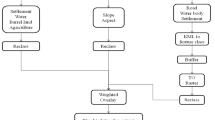
Geospatial solution for sustainable waste management: a case study
Article 22 May 2024

Applications of Geographic Information Systems to Site Waste Facilities in Saskatchewan—Phase 1
Chapter © 2023
Data availability
The datasets generated during or analysed during the current study are available from the corresponding author on reasonable request.
References
- Abdel-Shafy HI, Mansour MS (2018) Solid waste issue: sources, composition, disposal, recycling, and valorization. Egypt J Pet 27(4):1275–1290 Google Scholar
- Ajibade FO, Olajire OO, Ajibade TF, Nwogwu NA, Lasisi KH, Alo AB, Adewumi JR (2019) Combining multicriteria decision analysis with GIS for suitably siting landfills in a Nigerian state. Environ Sustain Indic 3:100010 Google Scholar
- Alavi N, Goudarzi G, Babaei AA, Jaafarzadeh N, Hosseinzadeh M (2013) Municipal solid waste landfill site selection with geographic information systems and analytical hierarchy process: a case study in Mahshahr County, Iran. Waste Manag Res 31(1):98–105 PubMedGoogle Scholar
- Arntzen J, Muchero MT, Dube P (2004) Global environmental change and food provision in southern Africa: explorations for a possible GECAFS research project in southern Africa. GECAFS southern Africa Planning Workshop, Cape Town, 13–15 September 2004. https://www.gecafs.orgGoogle Scholar
- Asefa EM, Damtew YT, Barasa KB (2021) Landfill site selection using GIS based multicriteria evaluation technique in Harar City, Eastern Ethiopia. Environ Health Insights 15:11786302211053174 PubMedPubMed CentralGoogle Scholar
- Asefa EM, Barasa KB, Mengistu DA (2022) Application of geographic information system in solid waste management. Environ Health Insights 1786302211053174
- Aslam B, Maqsoom A, Tahir MD, Ullah F, Rehman MSU, Albattah M (2022) Identifying and ranking landfill sites for municipal solid waste management: an integrated remote sensing and GIS approach. Buildings 12(5):605 Google Scholar
- Bhanye J, Dzingirai V (2020) Plural strategies of accessing land among peri-urban squatters. African Black Diaspora: An Int J 13(1):98–113. https://www.tandfonline.com/doi/abs/10.1080/17528631.2019.1639297
- Bundhoo ZM (2018) Solid waste management in least developed countries: current status and challenges faced. J Mater Cycles Waste Manag 20:1867–1877 Google Scholar
- Buor D (2018) Examining patterns of injury occurrence in rural and urban settings in sub-Saharan Africa: a critical review of the literature. Adv Soc Sci Res J 5(12)
- Cay T, Iscan F, Durduran SS (2004, July) The cost analysis of satellite images for using in GIS by the pert. In: XX ISPRS Congress, Com. IV, p 12–23. Google Scholar
- Charis G, Danha G, Muzenda E (2019) A review of the application of GIS in biomass and solid waste supply chain optimization: gaps and opportunities for developing nations. Detritus 6(June):96–106 Google Scholar
- Che NS, Bett S, Okpara EC, Olagbaju PO, Fayemi OE, Mathuthu M (2021) An assessment of land use and land cover changes and its impact on the surface water quality of the crocodile river catchment, South Africa. In: River deltas research-recent advances. 1 IntechOpen. https://www.intechopen.com/chapters/75065
- Chireshe A, Shabani T, Shabani T (2023) Safety and health risks associated with illegal municipal solid waste disposal in urban Zimbabwe. “A case of Masvingo City”. Saf Extreme Environ 1–10
- Dalzero S (2021) Not in my back yard (but it’s ok in theirs) an analysis of environmental racism. Adv Environ Waste Manag Recycl 4(34):207–212 Google Scholar
- David VE, John Y, Hussain S (2020) Rethinking sustainability: a review of Liberia’s municipal solid waste management systems, status, and challenges. J Mater Cycles Waste Manag 22:1299–1317 PubMed CentralGoogle Scholar
- Dlamini S, Simatele MD, Serge Kubanza N (2019) Municipal solid waste management in South Africa: from waste to energy recovery through waste-to-energy technologies in Johannesburg. Local Environ 24(3):249–257 Google Scholar
- Doorga JR, Rughooputh SD, Chung SY, McGivern A (2022) A geospatial approach for addressing long-term solid waste management issues: extracting value from waste. J Clean Prod 334:130282 Google Scholar
- Dos Muchangos LS, Tokai A, Hanashima A (2017) Stakeholder analysis and social network analysis to evaluate the stakeholders of a MSWM system–A pilot study of Maputo City. Environ Develop 24:124–135. https://www.sciencedirect.com/science/article/pii/S2211464516302676
- Dutta D, Goel S (2017) Applications of remote sensing and gis in solid waste management – a review. In: Goel S (eds) Advances in solid and hazardous waste management. Springer, Cham. https://doi.org/10.1007/978-3-319-57076-1_7
- Ekeu-Wei IT, Azuma KI, Ogunmuyiwa FBB (2018) Assessment of environmental impact of solid waste dumpsites using remote sensing. Niger J Technol 37(1):275–285 Google Scholar
- Gintamo TT, Mengistu H, Kanyerere T (2021) GIS-based modelling of climate variability impacts on groundwater quality: cape Flats aquifer, Cape Town, South Africa. Groundw Sustain Dev 15:100663 Google Scholar
- Gordon AT (2000) Solid waste management. MC Graw Hill, New York Google Scholar
- Guerrero LA, Maas G, Hogland W (2013) Solid waste management challenges for cities in developing countries. Waste Manag 33(1):220–232 PubMedGoogle Scholar
- Hangulu L, Akintola O (2017) Health care waste management in community-based care: experiences of community health workers in low resource communities in South Africa. BMC Public Health 17:1–10. https://link.springer.com/article/10.1186/s12889-017-4378-5
- Haregu TN, Ziraba AK, Aboderin I, Amugsi D, Muindi K, Mberu B (2017) An assessment of the evolution of Kenya’s solid waste management policies and their implementation in Nairobi and Mombasa: analysis of policies and practices. Environ Urban 29(2):515–532 Google Scholar
- Hayat P (2023) Integration of advanced technologies in urban waste management. In: Advancements in urban environmental studies: application of geospatial technology and artificial intelligence in urban studies. Springer International Publishing, Cham, p 397–418. https://link.springer.com/chapter/10.1007/978-3-031-21587-2_23
- Helal AH (2022) Multicriteria evaluation-GIS integration framework for landfill site selection in limited space regions: a case study in the West Bank. Adv Civ Eng 2022
- Hou H, Estoque RC, Murayama Y (2016) Spatiotemporal analysis of urban growth in three African capital cities: a grid-cell-based analysis using remote sensing data. J African Earth Sci 123:381–391 ADSGoogle Scholar
- Islam FS (2016) Solid waste management system in Dhaka city of Bangladesh. J Mod Sci Technol 4(1):192–209 MathSciNetGoogle Scholar
- Islam M, Kashem S, Morshed S (2020) Integrating spatial information technologies and fuzzy analytic hierarchy process (F-AHP) approach for landfill siting. City Environ Interact 7:100045 Google Scholar
- Iyer M, Tiwari S, Renu K, Pasha MY, Pandit S, Singh B, Vellingiri B (2021) Environmental survival of SARS-CoV-2–a solid waste perspective. Environ Res 197:111015 CASPubMedPubMed CentralGoogle Scholar
- Jhaveri RH, Shah PS, Patel NN, Patel DM, Thanki S, Bhoi AK, Bhatia J (2021) An ICT-based solid waste management system for smart cities: a case of municipality in India. Int J Ad Hoc Ubiquitous Comput 38(1-3):158–171. https://www.inderscienceonline.com/doi/abs/10.1504/IJAHUC.2021.119096
- Jerie S, Mandevere B (2018) Household solid waste management: how effective are the strategies used in Harare Zimbabwe. J Environ Waste Manag Recycl 2(1):16, 22 Google Scholar
- Jerie S, Zulu S (2017) Site suitability analysis for solid waste landfill site location using geographic information systems and remote sensing: a case study of Banket Town Board, Zimbabwe. Rev Soc Sci 2(4):19–31 Google Scholar
- Kabenge M, Elaru J, Wang H, Li F (2017) Characterizing flood hazard risk in data-scarce areas, using a remote sensing and GIS-based flood hazard index. Nat Hazard 89:1369–1387 Google Scholar
- Kadhila T (2019) Implementation of a municipal solid waste management system in Swakopmund, Namibia. Doctoral dissertation, Stellenbosch University, Stellenbosch
- Kahanji C, Walls RS, Cicione A (2019) Fire spread analysis for the 2017 Imizamo Yethu informal settlement conflagration in South Africa. Int J Disaster Risk Reduction 39:101146. https://www.sciencedirect.com/science/article/pii/S2212420918307623
- Kalonda JK, Govender K (2021) Factors affecting municipal service delivery: a case study of Katima Mulilo Town Council, Namibia. Afr J Public Aff 12(2):1–26 Google Scholar
- Kamwi JM, Cho MA, Kaetsch C, Manda SO, Graz FP, Chirwa PW (2018) Assessing the spatial drivers of land use and land cover change in the protected and communal areas of the Zambezi Region, Namibia. Land 7(4):131 Google Scholar
- Kasinja C, Tilley E (2018) Formalization of informal waste pickers’ cooperatives in Blantyre, Malawi: a feasibility assessment. Sustainability 10(4):1149 Google Scholar
- Kayakutlu G, Daim T, Kunt M, Altay A, Suharto Y (2017) Scenarios for regional waste management. Renew Sust Energ Rev 74:1323–1335 Google Scholar
- Kaza S, Yao L, Bhada-Tata P, Van Woerden F (2018) What a waste 2.0: a global snapshot of solid waste management to 2050. World Bank Publications, pp 1–295. https://openknowledge.worldbank.org/bitstream/handle/10986/30317/9781464813290.pdf?sequence=13&isAll
- Khan AH, López-Maldonado EA, Khan NA, Villarreal-Gómez LJ, Munshi FM, Alsabhan AH, Perveen K (2022) Current solid waste management strategies and energy recovery in developing countries-state of art review. Chemosphere 291:133088 CASPubMedGoogle Scholar
- Khumalo N, Maviza A, Nunu WN (2021) Spatial dynamics of illegal dumpsites and prevalence of diarrhoeal diseases in Makokoba Township in Bulawayo, Zimbabwe. Sci Afr 13:e00939 CASGoogle Scholar
- Kim D, Lee H, Okeowo MA, Basnayake S, Jayasinghe S (2017) Cost-effective monitoring of land subsidence in developing countries using semipermanent GPS stations: a test study over Houston, Texas. J Appl Remote Sens 11(2):026033–026033 ADSGoogle Scholar
- Kubanza N, Simatele MD (2019) Municipal solid waste management in South Africa: From waste to energy recovery through waste-to-energy technologies in Johannesburg. Local Environ 24(3):249–257. https://www.tandfonline.com/doi/abs/10.1080/13549839.2018.1561656
- Kumar A, Samadder SR (2017) A review on technological options of waste to energy for effective management of municipal solid waste. Waste Manag 69:407–422 CASPubMedGoogle Scholar
- Kumar P, Herath S, Avtar R, Takeuchi K (2016) Mapping of groundwater potential zones in Killinochi area, Sri Lanka, using GIS and remote sensing techniques. Sustain Water Resour Manag 2:419–430 Google Scholar
- Kundariya N, Mohanty SS, Varjani S, Ngo HH, Wong JW, Taherzadeh MJ, Bui XT (2021) A review on integrated approaches for municipal solid waste for environmental and economical relevance: Monitoring tools, technologies, and strategic innovations. Bioresource Tech 342:125982. https://www.sciencedirect.com/science/article/pii/S0960852421013249
- Kurniawan TA, Lo W, Singh D, Othman MHD, Avtar R, Hwang GH, Shirazian S (2021) A societal transition of MSW management in Xiamen (China) toward a circular economy through integrated waste recycling and technological digitization. Environ Pollut 277:116741 CASPubMedGoogle Scholar
- Kwenda PR, Lagerwall G, Eker S, van Ruijven B (2022) Identifying the leverage points in the household solid waste management system for Harare, Zimbabwe, using network analysis techniques. Sustainability 14(19):12405 Google Scholar
- Langa C, Nakamura K, Watanabe N, Komai T (2020) Regional landfill planning for improvement of waste management in Maputo, Mozambique. Adv Nat Appl Sci 14(3):89–96 Google Scholar
- Le NP, Nguyen TTP, Zhu D (2018) Understanding the stakeholders’ involvement in utilizing municipal solid waste in agriculture through composting: a case study of Hanoi, Vietnam. Sustainability 10(7):2314 Google Scholar
- Mabaso A, Shekede MD, Christa I, Zanamwe L, Gwitira I, Bandauko E (2015) Urban physical development and master planning in Zimbabwe: an assessment of conformance in the City of Mutare. Humanities Soc Sci (4):1–17. https://repository.unam.edu.na/handle/11070/1556Google Scholar
- Makonyo M, Msabi MM (2022) Potential landfill sites selection using GIS-based multi-criteria decision analysis in Dodoma capital city, central Tanzania. GeoJournal 87(4):2903–2933 Google Scholar
- Maria C, Góis J, Leitão A (2020) Challenges and perspectives of greenhouse gases emissions from municipal solid waste management in Angola. Energy Rep 6:364–369 Google Scholar
- Marshall RE, Farahbakhsh K (2013) Systems approaches to integrated solid waste management in developing countries. Waste Manag 33(4):988–1003 PubMedGoogle Scholar
- Matsa MM, Chokuda F, Mupepi O, Dzawanda B (2021) An assessment of groundwater quality in Zimbabwe’s urban areas: case of Mkoba 19 suburb, Gweru. Environ Monit Assess 193:1–15 Google Scholar
- Matsie R (2018) Developing an institutional GIS database of waste management in the north west province, South Africa. Doctoral dissertation, North-West University, South Africa
- McIndoe-Calder T (2018) Hyperinflation in Zimbabwe: money demand, seigniorage and aid shocks. Appl Econ 50(15):1659–1675. Google Scholar
- McIndoe-Calder T, Bedi T, Mercado R (2019) Hyperinflation in Zimbabwe. Springer International Publishing, pp 9–25 Google Scholar
- Mhoti P, Nhedzi E, Mapira J (2023) Household e-waste management practices in Gwanda town, Zimbabwe. Eur J Soc Sci Stud 8(4)
- Misi A, Gumindoga W, Hoko Z (2018) An assessment of groundwater potential and vulnerability in the Upper Manyame Sub-Catchment of Zimbabwe. Phys Chem Earth Parts A/B/C 105:72–83 ADSGoogle Scholar
- Mmereki D (2018) Current status of waste management in Botswana: a mini-review. Waste Manag Res 36(7):555–576 PubMedGoogle Scholar
- Mmereki D, Velempini K, Mosime-Serero L (2021) Status of municipal solid waste management policy implementation in developing countries: insights from Botswana. J Solid Waste Technol Manag 47(1):46–55 Google Scholar
- Mohammedshum AA, Gebresilassie MA, Rulinda CM, Kahsay GH, Tesfay MS (2014) Application of geographic information system and remotesensing in effective solid waste disposal sites selection in Wukro town, Tigray, Ethiopia. Int Arch Photogrammetry Remote Sens Spatial Info Sci 40:115–119. https://isprs-archives.copernicus.org/articles/XL-2/115/2014/isprsarchives-XL-2-115-2014.html
- Moremi M (2022) Municipal solid-waste collection and disposal management using geospatial techniques in Maseru City, Lesotho. Master’s thesis, Faculty of Engineering and the Built Environment
- Moyo D, Dunga HM (2020) The introduction of higher banknotes and inflation in Malawi: a test of bi-causality. Afr J Bus Econ Res 15(1)
- Muleya M, Hinchliffe G, Petterson M (2022) The environmental impact of landfill fires and their contaminant plumes at the Chunga landfill site, Lusaka, Zambia. African J Environ Sci Tech 15(12):569–579. https://hdl.handle.net/10292/14819
- Munyai O, Nunu WN (2020) Health effects associated with proximity to waste collection points in Beitbridge Municipality, Zimbabwe. Waste Manag 105:501–510 PubMedGoogle Scholar
- Mutobe B, Mubanga KH, Nchito WS (2022) Residents’ participation in solid waste management in Solwezi district, Zambia. J Environ 2(1):19–38 Google Scholar
- Mwanza BG, Mbohwa C, Telukdarie A (2018) Municipal solid waste management in Kitwe City: an engineering management perspective. Manag Environ Qual 29(6):1075–1092. https://doi.org/10.1108/MEQ-10-2017-0120
- Mwihaki NJ (2021) Application of experimental and modelling techniques to estimate the effects of landfill leachate on soil and water. Doctoral dissertation, University of South Africa
- Nambuli F, Togarepi C, Shikongo A (2021) Waste scavenging a problem or an opportunity for integrated waste management in Namibia: a case of Keetmanshoop Municipality, Namibia. Environ Pollut 10:2–47 Google Scholar
- Nanda S, Berruti F (2021) Municipal solid waste management and landfilling technologies: a review. Environ Chem Lett 19:1433–1456 CASGoogle Scholar
- Narayan AS, Marks SJ, Meierhofer R, Strande L, Tilley E, Zurbrügg C, Lüthi C (2021) Advancements in and integration of water, sanitation, and solid waste for low-and middle-income countries. Annu Rev Environ Resour 46:193–219 Google Scholar
- Ndeke B (2018) A GIS and remote sensing based modelling for landfill site selection: a case of City of Gweru, Midlands Province, Zimbabwe. Dissertation, Midlands State University
- Nhubu T, Muzenda E (2019) Determination of the least impactful municipal solid waste management option in Harare, Zimbabwe. Processes 7(11):785 Google Scholar
- Nhubu T, Mbohwa C, Muzenda E, Patel B (2019) Impacts of waste management practices on water resources in Harare. In: Wastes: solutions, treatments and opportunities III. CRC Press, p 531–536
- Nxumalo SM, Mabaso SD, Mamba SF, Singwane SS (2020) Plastic waste management practices in the rural areas of Eswatini. Soc Sci Humanit Open 2(1):100066 Google Scholar
- Nyampundu K, Mwegoha WJ, Millanzi WC (2020) Sustainable solid waste management measures in Tanzania: an exploratory descriptive case study among vendors at Majengo market in Dodoma City. BMC Public Health 20(1):1–16 Google Scholar
- Nyarai MP, Willard Z, Moses M, Ngenzile M (2016) Challenges of solid waste management in Zimbabwe: a case study of Sakubva high density suburb. J Environ Waste Manag 3(2):142–155 Google Scholar
- Panahi MR, Mousavi SM, Rahimzadegan M (2017) Delineation of groundwater potential zones using remote sensing, GIS, and AHP technique in Tehran–Karaj plain, Iran. Environ Earth Sci 76:1–15 Google Scholar
- Patel MS, Rangrej S (2021) Experiences of green infrastructure in urban planning. Int J Res Eng Sci 9(1):11–13
- Phonchi-Tshekiso ND, Mogomotsi PK, Mogomotsi GE, Gondo R (2020) A qualitative assessment of solid waste management in Peleng township in Lobatse, Botswana considering spatial aspects. Waste Disposal Sustain Energy 2:219–230. https://link.springer.com/article/10.1007/s42768-020-00042-zGoogle Scholar
- Record R, Kumar P, Kandoole P (2017) The importance of macroeconomic stability and fiscal management. https://doi.org/10.1596/978-1-4648-1194-4_ch2Google Scholar
- Rodić L, Wilson DC (2017) Resolving governance issues to achieve priority sustainable development goals related to solid waste management in developing countries. Sustainability 9(3):404 Google Scholar
- Samal B, Utkarsh P, Mani SK, Omprakash MD (2022) Spatial analysis of ground water contamination in close vicinity to solid waste landfill sites using GIS techniques-a study of Okhla landfill site in Delhi (a case study). In: Environmental degradation: monitoring, assessment and treatment technologies. Springer International Publishing, Cham, p 241–260. https://link.springer.com/chapter/10.1007/978-3-030-94148-2_22Google Scholar
- Senekane MF, Makhene A, Oelofse S (2022) A critical analysis of indigenous systems and practices of solid waste management in rural communities: the case of Maseru in Lesotho. Int J Environ Res Public Health 19(18):11654 PubMedPubMed CentralGoogle Scholar
- Serge Kubanza N, Simatele MD (2020) Sustainable solid waste management in developing countries: a study of institutional strengthening for solid waste management in Johannesburg, South Africa. J Environ Plan Manag 63(2):175–188 Google Scholar
- Shaanika GN (2019) Engineering geological mapping for urban development in low relief semi-arid regions (Outapi northern Namibia). Doctoral dissertation, University of Pretoria
- Shabani T, Jerie S (2023b) Medical solid waste management status in Zimbabwe. J Mater Cycles Waste Manag 25(2):717–732 Google Scholar
- Shabani T, Mutekwa VT, Shabani T (2023a) Developing a sustainable integrated solid waste management framework for rural hospitals in Chirumanzu district, Zimbabwe. Circ Econ Sustain 1–35. https://doi.org/10.1007/s43615-023-00313-x
- Shabani T, Jerie S (2022) A review on the effectiveness of integrated management system in institutional solid waste management in Zimbabwe. Environ Sci Pollut Res 2023:1–17 Google Scholar
- Shabani T, Jerie S (2023) A review of the applicability of environmental management systems in waste management in the medical sector of Zimbabwe. Environ Monit Assess 195(6):789 PubMedPubMed CentralGoogle Scholar
- Shabani T, Jerie S, Shabani T (2023) Applicability of the life cycle assessment model in solid waste management in Zimbabwe. Circ Econ Sustain 1–21
- Sharma HB, Vanapalli KR, Samal B, Cheela VS, Dubey BK, Bhattacharya J (2021) Circular economy approach in solid waste management system to achieve UN-SDGs: solutions for post-COVID recovery. Sci Total Environ 800:149605 CASPubMedPubMed CentralADSGoogle Scholar
- Sharma H, Kumar H, Mangla SK (2023) Enablers to computer vision technology for sustainable e-waste management. J Clean Prod 412:137396 Google Scholar
- Shekhawat N (2021) Geographic information systems and remote sensing. Vidya Books, Delhi, p 1–282. http://rguir.inflibnet.ac.in/jspui/bitstream/123456789/16282/1/9789354291555.PDFGoogle Scholar
- Simelane SP, Hansen C, Munghemezulu C (2021) The use of remote sensing and GIS for land use and land cover mapping in Eswatini: a review. S Afr J Geomat 10(2):181–206 Google Scholar
- Singh A (2019) Remote sensing and GIS applications for municipal waste management. J Environ Manag 243:22–29 Google Scholar
- Sinthumule NI, Mkumbuzi SH (2019) Participation in community-based solid waste management in Nkulumane suburb, Bulawayo, Zimbabwe. Resources 8(1):30. https://www.mdpi.com/2079-9276/8/1/30
- Sliusar N, Filkin T, Huber-Humer M, Ritzkowski M (2022) Drone technology in municipal solid waste management and landfilling: a comprehensive review. Waste Manag 139:1–16 CASPubMedGoogle Scholar
- Southern Africa Longitude and Latitude (SALL) (2017) Geographical co-ordinates. https://www.distancesto.com/coordinates/southern-africa-latitudelongitude.history.266174
- Spigolon LM, Giannotti M, Larocca AP, Russo MA, Souza NDC (2018) Landfill siting based on optimisation, multiple decision analysis, and geographic information system analyses. Waste Manag Res 36(7):606–615 PubMedGoogle Scholar
- Sulemana A, Donkor EA, Forkuo EK, Oduro-Kwarteng S (2018) Optimal routing of solid waste collection trucks: a review of methods. J Eng 2018
- Sylvester O, Ikudayisi O (2021) An overview of solid waste in Nigeria: challenges and management. Jordan J Earth Environ Sci 12(1):36–43 Google Scholar
- Tanyanyiwa VI (2015) Not in my backyard (NIMBY)?: the accumulation of solid waste in the avenues area, Harare, Zimbabwe. Int J Innovat Res Develop 4(2):122. https://www.researchgate.net/profile/Vincent-Tanyanyiwa-2/publication/331876415_Not_in_my_backyard_NIMBY_The_Accumulation_of_Solid_Waste_in_the_Avenues_Area_Harare_Zimbabwe/links/5c913912a6fdccd4602be76e/Not-in-my-backyard-NIMBY-The-Accumulation-of-Solid-Waste-in-the-Avenues-Area-Harare-Zimbabwe.pdf
- Tsai FM, Bui TD, Tseng ML, Wu KJ, Chiu AS (2020) A performance assessment approach for integrated solid waste management using a sustainable balanced scorecard approach. J Clean Prod 251:119740 Google Scholar
- Tushar SR, Alam MFB, Bari AM, Karmaker CL (2023) Assessing the challenges to medical waste management during the COVID-19 pandemic: implications for the environmental sustainability in the emerging economies. Socio-Econ Plan Sci 87:101513 Google Scholar
- Verhoef G (2019) Colonised, decolonised, centralised, and decentralised: the development of central banking in Mozambique, 1975–2010. Afr Hist Rev 51(1):1–24 Google Scholar
- Villa F, Vinti G, Vaccari M (2022) Appropriate solid waste management system in Quelimane (Mozambique): study and design of a small-scale center for plastic sorting with wastewater treatment. Waste Dispos Sustain Energy 4(1):49–62 PubMedPubMed CentralGoogle Scholar
- Yuxi C (2020) Improving the system of monitoring water resources of the state with the use of geographic information systems. Master’s thesis, КПІ ім. Ігоря Сікорського
- Zohoori M, Ghani A (2017) Municipal solid waste management challenges and problems for cities in low-income and developing countries. Int J Sci Eng Appl 6(2):39–48 Google Scholar





